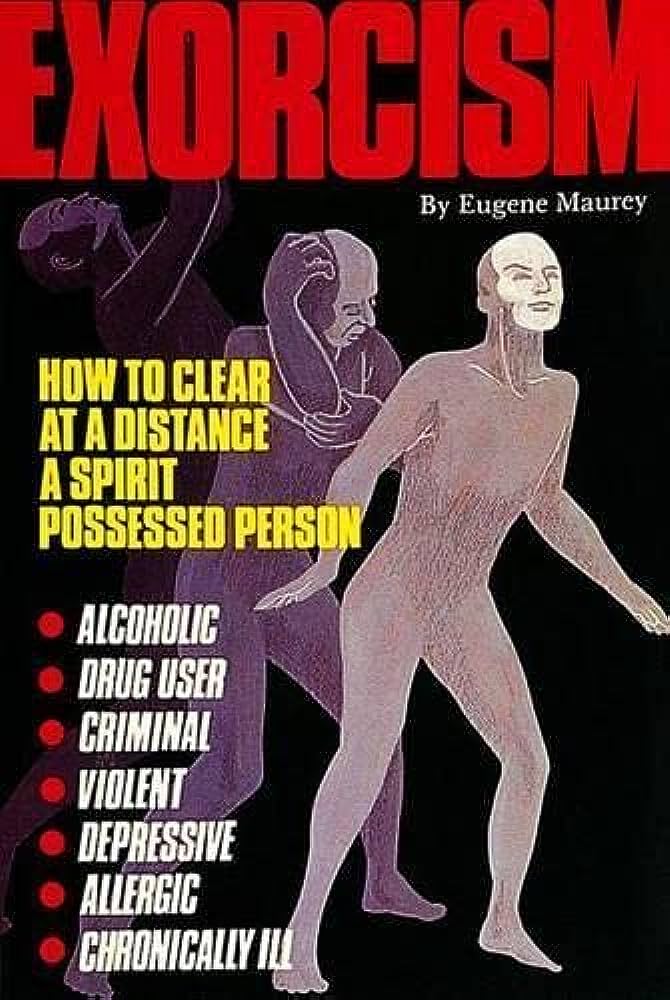Hey there! Have you ever wondered if a person can be possessed by a spirit? It’s a fascinating topic that has been debated for centuries. Some believe that spirits can take control of a person’s body and mind, while others think it’s just a product of imagination or mental illness. In this article, we’ll dive into the world of possession and explore different perspectives on the matter. Whether you’re a skeptic or a believer, there’s no denying that the concept of spirit possession sparks intrigue and curiosity. Let’s embark on this journey together and unravel the mysteries behind this age-old phenomenon!
Curious to know more? In the following paragraphs, we’ll explore various cultural beliefs and historical accounts of spirit possession. We’ll also delve into the psychological and scientific explanations behind these experiences. From ancient folklore to modern-day cases, you’ll learn about real-life encounters and the theories that surround them. So, if you’ve ever wondered about the existence of spirits and their alleged influence on humans, this article is for you. Get ready to challenge your beliefs and expand your knowledge on this captivating subject!
Understanding Possession
What is possession?
Possession refers to the belief that a person’s body can be inhabited or controlled by a spirit, entity, or supernatural being. Across cultures, possession is believed to occur when an individual’s consciousness is overtaken, and they exhibit alterations in their thoughts, behaviors, and physical manifestations. While possessions are often associated with negative and malevolent entities, there are also instances where spirits are seen as benevolent and aiding the possessed individual. The concept of possession has been prevalent in various religions, folklore, and spiritual practices throughout history.
Different beliefs about possession
Beliefs about possession vary greatly across different cultures and belief systems. In some cultures, possession is viewed as a form of communication with the divine or ancestors, and possessed individuals are treated with reverence and respect. In other cultures, possession is seen as a punishment or affliction, often attributed to evil spirits or witchcraft.
In addition to religious or spiritual beliefs, psychological and medical perspectives also exist. Some psychologists view possession as a dissociative disorder, where individuals may have multiple personalities or experience dissociation from their own identity. Medical professionals may interpret possession-like behaviors as symptoms of certain mental health conditions, such as psychosis or schizophrenia.
Signs of Possession
Physical symptoms of possession
In cases of possession, individuals may exhibit various physical symptoms that are believed to be caused by the presence of a spirit. Common physical manifestations include involuntary movements, convulsions, changes in voice or speech patterns, unusual strength, and resistance to pain. Some individuals may also exhibit marked changes in appearance, such as changes in facial features or the presence of unusual markings on the body.
Behavioral changes in possessed individuals
Possessed individuals often display distinct and drastic behavioral changes. These changes can include altered personality traits, extreme mood swings, aggression, self-harm, or self-destructive behaviors. Possessed individuals may also engage in actions that are considered socially inappropriate or taboo within their cultural context. These behavioral changes are often attributed to the influence and control of the possessing spirit.

Causes and Triggers
Spiritual explanations for possession
Spiritual explanations attribute possession to various causes and triggers. These include curses, black magic, or intentional malevolent acts by spirits or witches. Possession can also be seen as a result of spiritual vulnerability, such as engaging in activities that attract negative energies or opening oneself up to spiritual entities through rituals or unprotected spiritual practices. These spiritual explanations often involve the intervention of religious authorities or rituals to address or alleviate the possession.
Psychological factors that may contribute to possession
From a psychological perspective, possession-like experiences can be influenced by various factors. Trauma, such as experiencing abuse or witnessing a traumatic event, can trigger dissociative states that may be interpreted as possession. Additionally, individuals who have a strong belief in possession or who come from cultures with a deep belief in possession may be more susceptible to experiencing possession-like symptoms. The power of suggestion and cultural conditioning can play a significant role in shaping and interpreting these experiences.
Witness Accounts
Experiences shared by those who claim to have witnessed possession
Throughout history, there have been numerous accounts of individuals claiming to have witnessed possession. These witnesses often describe firsthand experiences of the possessed individual speaking in different voices, displaying unnatural physical strength, or exhibiting knowledge or behaviors that they would not normally possess. Witness accounts vary widely, depending on cultural contexts and belief systems, but they all share a common theme of unexplainable and extraordinary experiences.
Variations in possession experiences across cultures
Possession experiences differ across cultures, reflecting the diverse beliefs and practices surrounding possession. In some cultures, possession is thought to be a temporary and, at times, voluntary state entered into by individuals seeking spiritual insight or healing. In contrast, other cultures view possession as an involuntary and potentially dangerous condition that requires intervention from spiritual healers or religious authorities. The manifestations and rituals associated with possession also vary greatly, highlighting the cultural nuances and interpretations of this phenomenon.

Religious Perspectives
Views on possession in major religions
Possession is not limited to one specific religious tradition but can be found in various religions worldwide. In Christianity, possession is typically associated with malevolent spirits or demons and is often addressed through exorcism rituals. Islam acknowledges the possibility of possession by jinn or evil spirits, prescribing remedies such as recitations from the Quran or the use of spiritual healers. Hinduism believes in possession by gods, goddesses, or spirits, and possession is often seen as a divine communication or a form of worship. These religious perspectives shape the beliefs and practices surrounding possession within each respective faith.
Exorcism rituals and practices
Exorcism is a common practice found across different religions to alleviate possession. Exorcism rituals involve the invoking of spiritual authorities, such as priests, imams, or shamans, to expel the possessing entity from the individual’s body. These rituals often include prayers, sacred objects, and specific actions believed to counteract the presence of the spirit. Exorcisms can range from individual ceremonies to larger public events, depending on the cultural and religious context.
Medical and Scientific Explanations
Psychological disorders mistaken for possession
In some cases, possession-like behaviors can be misattributed to psychological disorders. Dissociative identity disorder (previously known as multiple personality disorder), schizophrenia, or other psychotic disorders can present symptoms that mimic possession. These disorders involve disruptions in an individual’s sense of identity, changes in behavior, and alterations in consciousness that can lead to experiences resembling possession. Accurate diagnosis and appropriate psychological or psychiatric interventions are essential to differentiate between actual possession and mental health conditions.
Neurological and physiological factors in possession-like behaviors
Recent scientific research has explored the neurological and physiological factors that may contribute to possession-like behaviors. Some studies suggest that certain brain disorders and abnormalities, such as epilepsy or sleep disorders, can result in altered states of consciousness or behavior that may be interpreted as possession. Additionally, cultural factors and expectations, combined with suggestibility and altered states of consciousness, can influence an individual’s experience of possession-like phenomena.

Historical Cases of Possession
Famous historical cases of possession
Throughout history, there have been notable cases of possession that have left a lasting impact on society. The case of the Loudun possessions in 17th-century France, where a convent of nuns exhibited signs of possession that led to accusations of witchcraft and subsequent exorcisms, remains a significant historical event. The case of Anneliese Michel in the 20th century, where a young woman underwent a series of exorcisms before her death, also garnered attention and sparked debates on the intersection of religion and mental health.
Impact of possession phenomena on society
Possession phenomena have deeply influenced societies worldwide, shaping religious practices, cultural beliefs, and even legal systems. In some cultures, the belief in possession and the rituals associated with it are deeply ingrained in everyday life, affecting familial structures, social norms, and community dynamics. Possession experiences, whether perceived as real or imaginary, have provoked fear, curiosity, and debate across cultures, leaving a lasting imprint on the collective consciousness of communities.
Debunking Possession Myths
Evidence against the existence of possession
While possession experiences are deeply ingrained in cultural and religious beliefs, skeptics argue that there is no scientific evidence to support the existence of possession as a supernatural phenomenon. Critics claim that possession can be explained through physiological, psychological, and sociocultural factors, rather than attributing it to spirits or supernatural entities. The lack of consistency in possession experiences and the wide range of cultural interpretations suggest that possession may be a subjective phenomenon originating from individual or cultural beliefs.
Psychological explanations for perceived possession
Psychological explanations for perceived possession oftentimes focus on the power of suggestion and suggestibility. Psychologists argue that individuals who strongly believe in possession may exhibit symptoms and behaviors consistent with their cultural expectations and conditioning. The sociocultural context in which possession occurs plays a significant role in shaping and reinforcing these experiences. Furthermore, dissociative disorders and other mental health conditions can manifest in ways that resemble possession, further blurring the distinction between belief and reality.

Cultural Interpretations
Folklore and cultural beliefs surrounding possession
Folklore and cultural beliefs contribute to the understanding and interpretation of possession phenomena. Many cultures have their own unique folklore and stories that depict possessions, often representing struggles between good and evil or acting as cautionary tales. These stories serve as cultural expressions, transmitting societal norms, values, and fears surrounding possession.
Explanations within indigenous and tribal communities
Within indigenous and tribal communities, possession is often deeply woven into cultural practices and spiritual beliefs. These communities may view possession as a means of communication with ancestral spirits or a channel through which spiritual knowledge is transmitted. Possession ceremonies and rituals are integral to their cultural and religious practices, fostering a connection between the community and the spiritual realm.
Conclusion
Summing up the discussion on possession
The concept of possession encompasses a wide range of beliefs, experiences, and interpretations. From religious perspectives to medical and scientific explanations, the understanding of possession varies greatly. Cultural, historical, and sociocultural factors shape the experiences and interpretations of possession phenomena, influencing beliefs and practices across different societies.
Importance of critical thinking in understanding supernatural phenomena
When evaluating the existence of possession or any supernatural phenomenon, critical thinking is crucial. It is essential to approach such phenomena with an open mind while also considering scientific evidence, psychological perspectives, and cultural context. Reflecting on the influence of belief systems and employing objective analysis can provide a more comprehensive and nuanced understanding of possession, allowing for respectful dialogue between different perspectives.
NUATE Spirit Box SB11 Ghost Hunting Equipment Radio Sweep Ghost Box
| Paranormal Ghost Hunting Equipment Digital EVP Voice Activated Recorder USB US 8GB (Wine Red) |
| Ghost Hunting Equipment Hand-held EMF Meter Spirit Box Paranormal Equipment |

